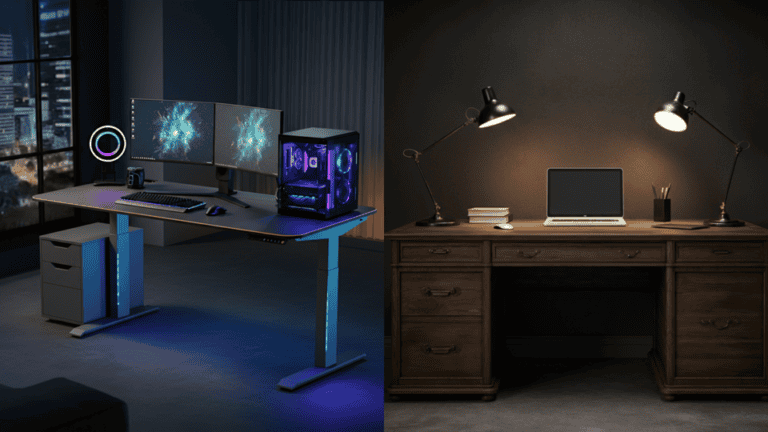Smart desks represent a revolutionary leap in workspace design, combining cutting-edge technology with ergonomic principles to create a more productive and comfortable work environment. Unlike traditional desks, which are static pieces of furniture, smart desks are dynamic workstations equipped with various technological features that adapt to users’ needs and preferences.
Core Smart Features
Height Adjustment Mechanisms
One of the defining characteristics of smart desks is their ability to adjust height. This feature is powered by:
- Electric motors that smoothly raise or lower the desk surface
- Memory presets that allow users to save preferred heights
- Programmable height ranges for customized adjustments
These mechanisms enable users to alternate between sitting and standing positions throughout the day, promoting better posture and reducing the health risks associated with prolonged sitting.
Connectivity and Integration
Smart desks are designed to seamlessly integrate with modern technology ecosystems:
- Bluetooth capabilities allow for easy pairing with devices
- Wi-Fi connectivity enables remote control and data synchronization
- Integration with smart home systems for a cohesive tech experience
These connectivity features transform the desk into a hub for managing various aspects of the work environment.
Built-in Technology
To enhance functionality, smart desks often incorporate:
- Touchscreen controls for intuitive operation
- USB charging ports for convenient device powering
- Wireless charging pads for cable-free charging of compatible devices
These built-in technologies streamline workspace organization and reduce clutter.
Advanced Smart Features
Health and Wellness Tracking
Many smart desks go beyond basic functionality to promote user well-being:
- Posture sensors detect and alert users to poor sitting habits
- Sit-stand time tracking helps users maintain a balanced work routine
- Activity reminders encourage regular movement and breaks
These features aim to improve overall health and reduce the negative impacts of sedentary work habits.
Environmental Sensors
Some advanced models monitor the surrounding environment:
- Temperature monitoring ensures optimal comfort
- Humidity detection helps maintain ideal working conditions
- Air quality sensors alert users to potential health hazards
By keeping track of these factors, smart desks contribute to a healthier and more comfortable workspace.
Customization and Personalization
Smart desks offer extensive personalization options:
- User profiles store individual preferences and settings
- App-based controls allow for remote adjustments and monitoring
- Voice command compatibility enables hands-free operation
These features ensure that the desk adapts to each user’s unique needs and working style.
Smart Desk Technology
The intelligence of smart desks relies on a combination of hardware and software components:
- Sensors and actuators gather data and execute physical adjustments
- Microprocessors and control systems process information and manage desk functions
- Software and firmware enable user interaction and feature updates
This technological foundation allows smart desks to respond to user inputs and environmental changes in real-time.
Data Management and Privacy
Smart desks collect various types of data to enhance user experience:
- Usage patterns and preferences
- Environmental readings
- Health and activity metrics
This data is typically stored and processed either locally or in the cloud. Privacy considerations are paramount, with many manufacturers implementing robust security measures and giving users control over their data sharing preferences.
Future Trends in Smart Desk Features
The evolution of smart desk technology continues to push boundaries:
- AI-powered ergonomic suggestions may provide personalized recommendations for optimal desk setup and usage
- Integration with wearable devices could offer more comprehensive health tracking and insights
- Augmented reality workspace enhancements may create immersive and customizable virtual work environments
These advancements promise to further blur the lines between physical and digital workspaces.
Conclusion
Smart desks represent a significant leap forward in workspace design, offering a range of features that enhance productivity, comfort, and well-being. From height adjustability and connectivity to health tracking and environmental monitoring, these intelligent workstations are reshaping how we interact with our work environments. As technology continues to evolve, smart desks are poised to play an increasingly important role in creating more efficient, healthy, and personalized workspaces for the future.

